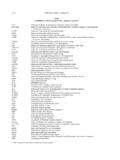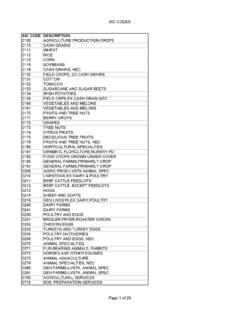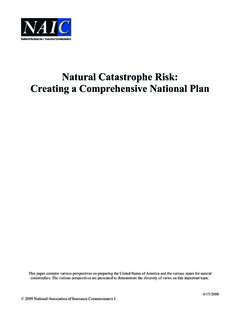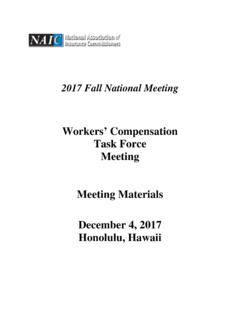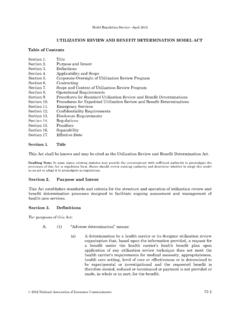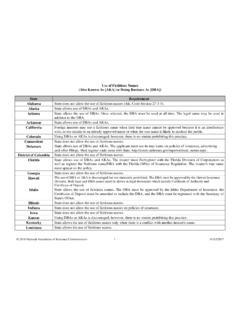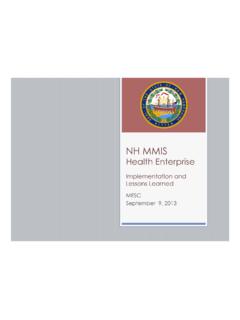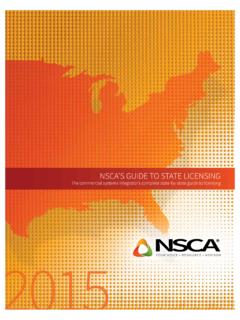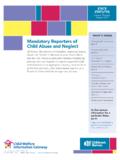Transcription of An Overview of Workers' Compensation …
1 An Overview of Workers Compensation IndependentContractor RegulatoryApproaches An Overview of Workers Compensation IndependentContractor Regulatory ApproachesNAIC/IAIABC Joint Working Group of theWorkers Compensation (C) Task ForceAdopted March 17, 2009 Accounting & ReportingAccountants, members of the insurance industry andeducators will find relevant information about statutoryaccounting practices and InformationConsumers, educators and members of the insuranceindustry will find important answers to common questionsin guides about auto, home, health and life Regulation Accountants, financial analysts and lawyers will findhandbooks, compliance guides and reports on financialanalysis, state audit requirements and laws.
2 Regulations and guidelines apply to membersof the legal and insurance ActivitiesInsurance industry members will find directories, newsletters and reports affecting NAIC StudiesAccountants, educators, financial analysts, members ofthe insurance industry, lawyers and statisticians will findrelevant products on a variety of special ReportsInsurance industry data directed at regulators, educators,financial analysts, insurance industry members, lawyersand ProductsAccountants, educators, financial analysts, insurers,lawyers and statisticians will find guidelines, handbooks,surveys and NAIC positions on a wide variety of Valuation OfficeProvides insurers with portfolio values and proceduresfor complying with NAIC reporting Papers Accountants, members of the insurance industry andeducators will find relevant information on a variety ofinsurance topics.
3 2009 National Association of Insurance Commissioners. All rights : 978-1-59917-264-4 Printed in the United States of AmericaNo part of this book may be reproduced, stored in a retrieval system, or transmitted in any form or by any means, electronic or mechanical, including photocopying, recording, or any storage or retrieval system, without written permission from the NAIC is the authoritative source for insurance industry information. Our expert solutions support the efforts ofregulators, insurers and researchers by providing detailed and comprehensive insurance information. The NAIC offers a wide range of publications in the following categories:For more information about NAIC publications, view our online catalog Central Office2301 McGee Street, Suite 800 Kansas City, MO Securities Valuation Office48 Wall Street, 6th FloorNew York, NY Executive Office444 North Capitol Street NW, Suite 701 Washington, DC 20001 following companion products provide additional information on the same or similar subject matter.
4 Manycustomers who purchase the An Overview of Workers Compensation Independent Contractor RegulatoryApproaches also purchase one or more of the following products:Companion ProductsWorkers' Compensation Large Deductible Study Today, large deductible policies are a major factor in the workers Compensation marketplace. This study was written to inform about currentworkers Compensation large deductible issues and to provide findings andrecommendations in regard to those issues. Adequate attention to therecommendations provided is anticipated to resolve many of the concerns anddemonstrated problems that states have experienced with this alternativeproduct.
5 Copyright 2006. Report on Employee Leasing and Professional Employer Organizations This report weighs the advantages and disadvantages of the master policyapproach and the multiple coordinated policy approach in workers Compensation insurance for employment services outsourcing. It alsodiscusses the use of new terms to represent language previously associatedwith these types of operations and provides a listing of various issues for stateregulators and legislators to ponder when addressing this topic in their of the Multiple Rating Organizations Study Group to the Workers' Compensation Task Force This white paper is intended to help public policymakers identify theramifications of having more than one advisory rating or statistical organizationfor workers' Compensation .
6 The goal of this publication is to provide athorough analysis of the issues presented by this type of situation, as well ashelp insurance regulators craft solutions to fit their jurisdictions particularcircumstances. Copyright orders must be prepaid, including shipping charges. Please contact an NAIC Customer Service Representative, Monday Friday, 8:30 am 5 pm CT. - - NAIC/IAIABC Joint Working Group Name Affiliation Name Affiliation Eric Cioppa, Co-chair NAIC (ME) Tammy Lohmann NAIC (MN) Alan McClain, Co-chair IAIABC (AR) Angela Nelson NAIC (MO) Greg Krohm IAIABC Exec.
7 Dir. Keith Messmer IAIABC (MT) Bill Lacy NAIC (AR) Allen Kassebaum IAIABC (NE) Christine Baker IAIABC (CA) Alan Wickman NAIC (NE) Christopher Citko NAIC (CA) Linda Baum NAIC (NJ) George Bradner NAIC (CT) Grover Czech NAIC (NJ) Robert Nkojo NAIC (DC) Gary Cooper NAIC (NV) Clark Simcock NAIC (DC) Janice Moskowitz NAIC (NV) Richard Koon NAIC (FL) Kathie Stepp NAIC (OK) Lora Miyasaki NAIC (HI) Rae Taylor NAIC (OR) Shelley Santo NAIC (HI) Elizabeth Crum IAIABC (PA) John Gatlin NAIC (IL) Paula Pallozzi NAIC (RI) Dick Cook NAIC (KS) Brad Tibbitts NAIC (UT) Richard Thomas IAIABC (KS) Fred Barrett NAIC (VT) Robin Coombs NAIC (KY) James Becker NAIC (WV) Walter Horn NAIC (MA) Bill Kenny NAIC (WV) Bob Wake NAIC (ME) Ryan Sims NAIC (WV) 2009 National Association of Insurance Commissioners 2 Executive Summary Because it is social insurance, universal coverage of employees is a cherished principle of workers Compensation .
8 Yet, from the beginning, workers Compensation laws exempted certain workers. The subject of this paper is the exemption commonly given to independent contractors. Establishing criteria for an independent contractor vis-a-vis an employee has proven to be very challenging to jurisdictions. In the review of state criteria and their administration, we find a wide range of approaches. Indeed, a key finding of this paper is that control of the work is a core principle that government programs continue to honor as the key principle defining employment versus contracting.
9 Yet control is hard to measure and can be easily feigned. Seeking more certainty in the application of the law, states have developed an abundant range of other criteria and screens to more easily and clearly separate employees from contractors. The paper discusses the ramifications of different laws and procedures. Equity and economic freedom are considered. The paper stresses the impact of different screening systems on the administration of the workers Compensation system. The paper takes no specific position on which class of regulatory system a state should use.
10 But it does offer several recommendations for improving the smooth and fair application of exemptions for independent contractors. These recommendations stress clarity in the criteria and a vigorous educational campaign by states and insurers to help employers understand the criteria and how they will be applied by state enforcement agencies and insurers at time of audit. Purpose The basic premise of the workers Compensation system is that employers assume financial responsibility for paying or insuring the statutory benefits for work-related injuries to their employees.

